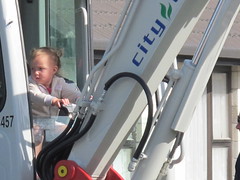
Search
Images for rebuild; more images...
Risk Management Plan
Articles, UC QuakeStudies
A plan which defines the risk and opportunity management activities to be applied by SCIRT to meet SCIRT objectives. The first version of this plan was produced on 12 September 2011.
Schedule Management Plan
Articles, UC QuakeStudies
A plan which describes SCIRT's approach to schedule management. The first version of this plan was produced on 20 September 2011.
Brunel lecture locations
Articles, UC QuakeStudies
A pdf copy of a PowerPoint presentation which illustrates the locations where Duncan Gibb presented his Brunel lecture.
Pipe Installation Options Report
Articles, UC QuakeStudies
A report reviewing pipe installation specifications and recommending alternatives that could improve standard specifications.
Dress Sam SCIRT
Articles, UC QuakeStudies
A pdf copy of a cut-out dress-up game for young children involving safety gear.
Best Practice for Cyclists - Christchurch
Articles, UC QuakeStudies
A best practice traffic management guideline, produced in February 2014, which helps traffic management team members manage cyclists through road work sites safely.
Well-grounded solution to soggy sites
Articles, UC QuakeStudies
A document which describes best practice for dewatering guidelines.
Guideline 064: Design of an Automated Flushing Siphon System
Articles, UC QuakeStudies
A guideline to inform designers on the design of an Automated Flushing Siphon System as a means to reduce the frequency of blockages on the wastewater network caused by pipe dips and flat grades.
Lions roar back into the city centre
Articles, UC QuakeStudies
A web story about the return of the stone lions to the Memorial Arch.
Beca Heritage Week brochure - Central City
Articles, UC QuakeStudies
A brochure created for Beca Heritage Week 2014, outlining SCIRT's repair work on heritage structures in the Central City. It was handed out to members of the public at SCIRT's walk and talk tours.
Gloucester Street bridge, Christchurch - report on archaeological monitori…
Articles, UC QuakeStudies
A report which details the archaeological monitoring carried out during the course of SCIRT project 11136, repairs to the Gloucester Street bridge.
May 2014 St Martins School visit - presentation
Articles, UC QuakeStudies
A presentation given to St Martin's primary school students about SCIRT work in Opawa and Hillsborough.
Central City Transport Optimisation Management Plan
Articles, UC QuakeStudies
A copy of the plan developed in 2011 to facilitate a collaborative approach between all stakeholders and minimise the impact on the traffic network, because of the extensive repair works necessary to repair vertical and horizontal infrastructure.
Red Cross presentation to SCIRT - communication and communities
Articles, UC QuakeStudies
A pdf copy of one of a series of presentations which Red Cross presented to SCIRT, telling them about what the community is undergoing and how Red Cross helps.
Far-sighted and comprehensive - Alliance Objectives steer the SCIRT journey
Articles, UC QuakeStudies
A document which discusses the importance of the Alliance Objectives to the operation of SCIRT.
Five easy steps to minimise impact on businesses poster - traffic manageme…
Articles, UC QuakeStudies
A tool, in the form of a poster, given to workshop and toolbox participants and hung up at worksites and in offices, outlining five easy steps to minimise the impact of roadworks on businesses.
Face-to-face survey questions
Articles, UC QuakeStudies
A document containing the research questions asked by Opinions Market Research Ltd when carrying out face-to-face surveys about SCIRT work.
The Lonely Cone Recall communication plan
Articles, UC QuakeStudies
A document which outlines the communication strategy behind the Lonely Cone campaign.
Through Their Eyes toolbox outline
Articles, UC QuakeStudies
A tool, including an outline, resources and a survey sheet, used by SCIRT's Transport Planning Manager when delivering a series of toolboxes to SCIRT traffic staff about working around businesses.
Open for Business signs
Articles, UC QuakeStudies
A photograph taken in 2013, showing one of the 32 large 'Open for Business' signs placed on all of the main routes into the CBD.
Triumphal Arch presentation by site engineer
Articles, UC QuakeStudies
A presentation prepared by one of the site engineers restoring the Memorial Arch and Bridge of Remembrance, outlining the damage to the structures, the repair designs and the construction methodologies.
Safety Initiative: Use of a remotely operated hydraulic jaw crusher
Articles, UC QuakeStudies
A document describing the use of a remotely operated hydraulic jaw crusher to avoid the need to make confined space entries.
Bridge of Remembrance community engagement presentation
Articles, UC QuakeStudies
A presentation prepared by SCIRT's Downer Communciation Lead, providing an overview of the community engagement carried out by the Downer Team during the restoration of the Bridge and Arch.
Bridge of Remembrance Kids Zone attracts central city school pupils
Articles, UC QuakeStudies
A web story about a site visit to the Bridge and Arch by local school pupils.
Safety Initiative: Confined spaces "dummy run
Articles, UC QuakeStudies
A document describing the confined spaces "dummy run".
Environmental Initiative: Triumphal Arch major column seismic clamps
Articles, UC QuakeStudies
A document describing Downer's use of column seismic clamps to prevent additional damage to the Arch columns.
Environmental Initiative: bentonite splash fence
Articles, UC QuakeStudies
A document describing Downer's approach to containing bentonite when drilling micro piles for the new Arch foundations.
Lest we forget - SCIRT restores Memorial Arch
Articles, UC QuakeStudies
A document which describes the process that SCIRT took to restore the Bridge of Remembrance and Memorial Arch.
Bridge of Remembrance poster for awards application
Articles, UC QuakeStudies
A poster which was prepared to go with the award application for the Canterbury Heritage Awards 2016.
Bridge of Remembrance posters
Articles, UC QuakeStudies
Posters which describe the earthquake damage, planned restoration methods and historic information about the Bridge of Remembrance and Memorial Arch. These posters were hung on the fencing around the Bridge and Arch to inform the public about the work taking place.


